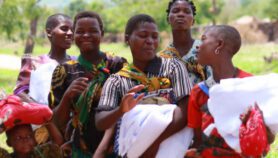Send to a friend
The details you provide on this page will not be used to send unsolicited email, and will not be sold to a 3rd party. See privacy policy.
Below is a round up of news from or about Sub-Saharan Africa for the period 1–14 January 2009.
South African bioprospecting legislation ‘needs urgent reform’
Stringent regulations are threatening to strangle South Africa’s ability to harness its genetic resources for drug development, damage broad-scale screening programmes and close down bioresource-based industries, according to research led by Neil Crouch of the South African National Biodiversity Institute and published in the South African Journal of Science.More>>![]() [787kB]
[787kB]
Kenyan researchers find more accurate test for sleeping sickness
Scientists have found a more accurate and efficient way of detecting the sleeping sickness parasite in blood samples. The method drastically reduces the labour, time and cost of carrying out standard polymerase chain reaction tests — opening the way for large-scale studies, according to Samuel Thumbi and Francis McOdimba of the International Livestock Research Institute, Reuben Mosi, a lecturer at the University of Nairobi’s Faculty of Veterinary Medicine and Joseph Jung’a from the Institute of Primate Research. More>>![]()
![]()
![]()
![]()
![]()
![]()
![]()
![]()
![]()
![]()
![]()
Egypt and Nigeria outperformed South Africa in agricultural research
A ten-year-study (1996–2005) of science indicators has found that Nigeria and Egypt often had higher ratings than South Africa in peer-reviewed agricultural research. Egypt also outranked South Africa in physics, pharmacology, chemistry, engineering and materials science. But South Africa researchers scored better than Nigeria or Egypt for how often their papers were cited.More>>![]()
![]()
![]()
![]()
![]()
![]()
![]()
![]()
![]()
![]()
![]()
Benin researchers explore genetic potential of cultivated cowpeas
Afio Zannou and Adam Ahanchédé from the University of Abomey-Calavi in Cotonou have led Benin’s first study of the genetic diversity of cowpeas, an essential food crop grown for its young leaves and grains. Molecular markers based on differences in DNA sequences successfully showed far greater genetic diversity than more limited techniques. More>>![]()
![]()
![]()
![]()
![]()
![]()
![]()
![]()
![]()
![]()
![]()
East African countries strengthen pharmaceutical skills
Pharmacy lecturers from Kenya, Rwanda, Tanzania and Uganda have collaborated on a two-year project to combat skills shortages in supply chain management. This will ensure that the correct storage, dosing and record-keeping is carried out for drugs like antiretrovirals, according to lead author Lloyd Matowe from Makerere University in Uganda. More>>![]()
![]()
![]()
![]()
![]()
![]()
![]()
![]()
![]()
![]()
![]()
Jackals ‘maintain rabies virus’ in South African wild
Genetic sequencing reveals that the fatal rabies virus can survive in wild mammals — such as black-backed jackals — without requiring re-infection by rabid domestic dogs, according to researchers from South Africa’s Onderstepoort Veterinary Institute and the Faculty of Veterinary Science at the University of Pretoria, who say wildlife rabies control must accompany domestic animal vaccinations.More>>
Tanzania to train more healthcare workers
Ephata Kaaya from Muhimbili University of Health and Allied Sciences will collaborate with US partners on a two-year project to tackle the shortage of healthcare workers — including nurses, pharmacists, dentists and doctors — in Tanzania. The project, which received a US$7.5 million grant from the Bill and Melinda Gates Foundation, aims to recruit additional workers and increase both research and education output. More>>
Ghana finds fee-free not so healthy
Although user fees are a known barrier to accessing health care, free health care does not necessarily improve health outcomes, according to a randomised trial of more than 2,000 households with young children in malaria zones, led by Evelyn Korkor Ansah from Ghana’s Dangme West District Health Directorate in Dodowa.More>>![]()
![]()
![]()
![]()
![]()
Health data collection no easy task in the DRC
Matthieu Kamwa of the WHO and Xavier de Radiguès of the Health and Nutrition Tracking Service are collecting data for a retrospective mortality survey of the more than 30,000 Democratic Republic of Congo (DRC) refugees trapped in neighbouring Uganda. Despite ongoing violence, laboratory technicians in North Kivu are helping to analyse health risks such as dysentery in refugee camps. More>>![]()
![]()
![]()
![]()
![]()
Nigeria gets new minister of information and communications Pharmacy researcher Dora Akunyili has moved from Nigeria’s National Food and Drugs Administration and Control Agency, where she cracked down on contaminated food and counterfeit drugs, to her first cabinet post. As the new Minister of Information and Communications, Akunyili says Nigeria has over 50 million active cellphone users. More>>
Compiled by Christina Scott. Additional reporting by Sharon Davis.
If you would like to suggest a story for this news in brief, please contact the Africa News Editor Christina Scott ([email protected]).













